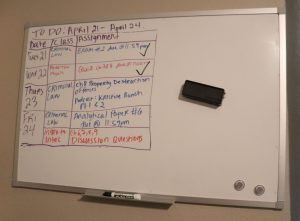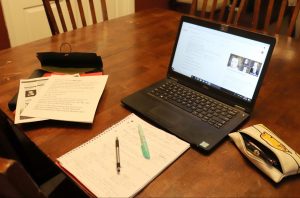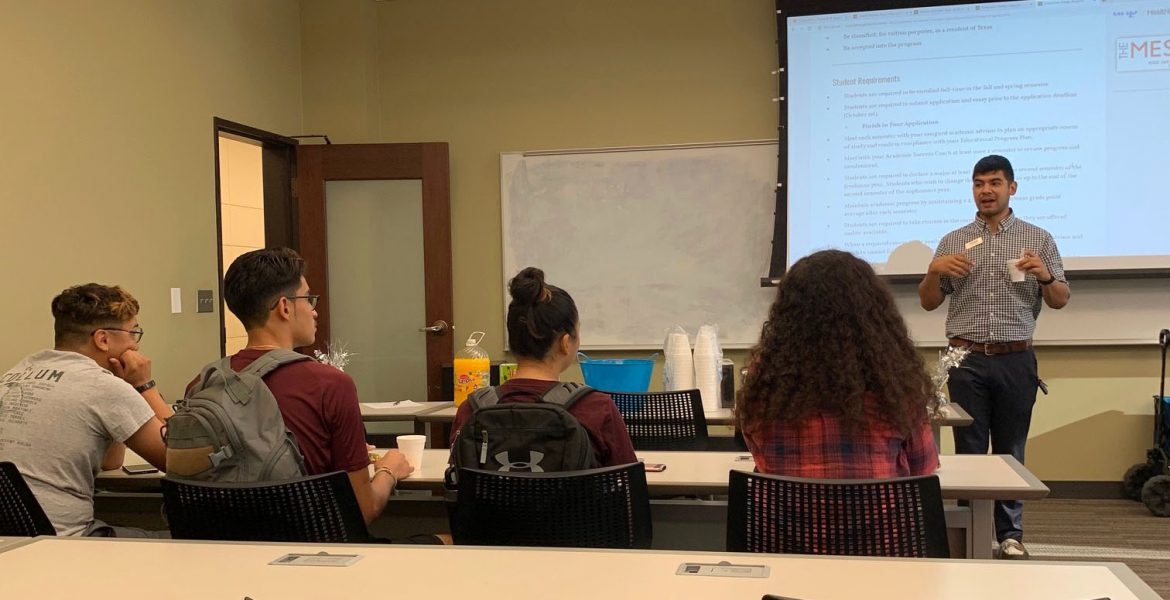Some students at Texas A&M University-San Antonio have expressed concern or frustration with online classes. The Mesquite thanks the Student Success Center for answering the following questions about remote learning.
The staff members who participated were Kim Nañez, executive director, Student Success Center; D’Andrea Davila, foster/academic coach; Michelle Anguiano, academic coach III; and Hugo Cantero, academic coach II.
The Mesquite: A student said they do not attend online classes or look at the PowerPoints or videos that faculty put on Blackboard. How can they motivate themselves to be involved with classwork and homework?

Davila: Short-term fixes that could help the student right now include:
- Taking a walk or exercising to raise motivation levels and clear your mind before you begin the task at hand.
- Commit to a single task and write it down. This will allow you to focus on that one thing instead of the whole thing, which can sometimes be overwhelming.
- Clear your workspace or desk and prep for a single task.
- Use a mental low-effort hack to get started. Write what is on your mind right now and reference later; this will help get your writing process started.
- Use the Pomodoro technique: 25 minutes of study time/five-minute break, do 25/5 four more times, then take a long break. I have also used the 45-minute study time/15-minute break especially if you feel like you’re on a roll. Give yourself study breaks. You are trying to retain the information, not just read through it. By completing the steps above, including self-discipline and having healthy study habits, this will help motivation build up over a period of time.
This will not stop loss of motivation completely, but it is a good start that could become a routine every semester as you continue your academic journey. I referenced https://collegeinfogeek.com/ for the above information.
The Mesquite: Tips for students who are forgetting their assignments, checking their school email or Blackboard?
Anguiano:
- Pull all items out of the digital space and write it down on paper. Take one class at a time. Go to your first course and with your updated syllabus in hand, go to BlackBoard and write all the assignments for the coming week that are due.
- If there are articles to read, download the articles and save them in a folder you created for that class. As you are writing each activity/assignment down, you are creating a to-do list to complete one item at a time. After you have written all the deadlines, then move to the next. Once you have completed this task, go back to the first class assignments and go down the list, look at how you can do that day or how you break the assignment into small pieces each day throughout the week. Example: If you have a two-to three-page page essay due the following week:
- on one day you might brainstorm ideas to narrow your topic
- next day, read some articles on the topic and take notes,
- next day, create an outline of how you will organize your essay,
- the next day, start writing your essay draft and so forth, until your essay is complete.
Once you have broken down assignments for your first class, decide how long it will take to complete each part. In the essay example, if you start tackling your assignment on Saturday, then maybe brainstorming will take 30 minutes; finding articles, one hour; reading two to three articles and taking notes, two hours. Once you decide on the length of time, put it into a time grid (e.g., from 10-10:30 a.m: brainstorming, 10:30-11:30 a.m: search for articles and so forth, and you now have your study session for part of your day organized and ready to go.

Small steps, one thing at a time.
The Mesquite: How can students establish self-discipline when it is all on the student to get their work done online?
Anguiano: Reward yourself after completing a productive study session. This can be social media time, a movie online, delivery from your favorite restaurant/fast food place, whatever you consider a treat that works under our current circumstance.
The Mesquite: What are good study habits for students doing remote learning?
Cantero:
- Staying connected with classmates, working in a remote group even by phone or text.
- Using a Time Management Grid or Weekly Calendar to outline specific times to complete certain assignments.
- Take breaks in between each task to avoid stress, overwhelming yourself, or avoid headaches due to being on the screen all the time.
The Mesquite: What advice do you have for students who find it hard to distance themselves from distractions: family, phone, background noise, etc.?
Nañez:
- See if you are able to work with your family (may not be doable for all students) to create a schedule for online learning.
- Reach out to ITS and get a loaner laptop and mifi (so you do not have to at least share technology).
- Some students may realistically not be able to distance themselves from these distractions. Find a space/time (even if it is an hour a day) to work on school things
- Consider credit/no credit and the drop deadline (not to stop working on classes, but because it might be difficult to balance your home life and school)

The Mesquite: What can students do when family members think that now that they are home, they have all the time in the world to do things for them?
Nañez: This is a common issue for students even outside of COVID-19. Living at home and transitioning to adulthood lends itself to hard conversations between a parent and a college student. Setting boundaries with family members is difficult. These conversations take time.
- Start the conversation by saying something like, “I am feeling overwhelmed with school right now. Can we talk?” Make sure it is a good time to have this conversation.
- Show a schedule of the time you are working on class assignments. It might help family members understand times that are “blocked” for school.
- Give specific times you can run errands, help with family members or siblings, and do chores around the house. You want to still help the family because this is a hard time for everyone. See if your family is OK with slotted times that you can help, such as 10-11 a.m. Tuesday and 4-5 p.m. Friday.
The Mesquite: How do students cope with professors who are not as available as before?
Nañez: Much like students, professors are struggling with this change — having their families home with them, juggling schooling their children and running their classes online.
- Be patient. Send emails and call your professors.
- Check the syllabus. What ways does your professor say you can contact them? Do they list a phone number? An email address?
- Check the A&M-SA directory for a phone number and email if you cannot find it on the syllabus.
- Be persistent. If there are different ways to contact the professor, use that — for example, Blackboard messaging, the Remind app, etc.
- If all else fails, reach out to your academic adviser or academic coach.
The Mesquite: What are some tips for final exams?
Nañez: I would recommend that students look at their revised syllabus for each class, find out when they have finals scheduled and write those dates and times down.
- Is each professor administering a final?
- Are all of your finals on the same day?
- See if your professor is giving the option to take the exam a week. (Maybe the exam is open for a week.)
- If that is the case, then organize finals that are open for a week and decide which days of the week you want to take the final.
- If you do have more than two finals on one day, reach out to your professor for options
- Schedule an appointment with an academic coach to help you plan out your finals week.
The Mesquite: What advice do you have for students who balance work, home, class life and family?
Nañez: Validate your experience. Things are tough right now for many of us. That is OK.
- Maintain structure as best you can.
- Find ways to keep a schedule and maintain it.
- Reach out for support: Academic Advising, Academic Coaching and Student Counseling and Wellness Services are all available virtually. We are here for you and want to help.
- Be mindful of the amount of time you are reading or watching the news. Some have suggested going on a “media diet.” Maybe limit yourself to 30 minutes a day. Read positive things about this situation. Have you watched SGN?
- Stay connected. Set up a Google Hangout with friends and family who are not at home with you. Do fun things like virtually watch your favorite show together. I still have virtual lunch meetings with colleagues and friends.
Source: https://www.mcleanhospital.org/news/tips-help-college-students-during-covid-19-pandemic
The Mesquite: Do you have any positive advice for students who are struggling during quarantine?
Nañez: You are not alone. Many people are struggling. It might not be with the same things, but we are.
- Go outside for walks if you can or start exercising. Seeing so many people being active right now is a cool thing.
- This is hard. Being a student, living at home with family, working or not working, taking care of family members is not easy. It is OK to say that this is hard.
- The staff and faculty at A&M-SA miss you and want to be back on campus with you. We really cannot wait to see you again!
Click here for tips on how to stay organized. It was created by Hugo Cantero, Academic Coach II.
Students can reach their academic adviser or academic coach at 210-784-1307. To schedule an appointment with the Student Success Center, visit JagWire and log into EAB-Student Success Collaborative. Click here for directions on scheduling appointments.
This Q&A has been edited and condensed.







